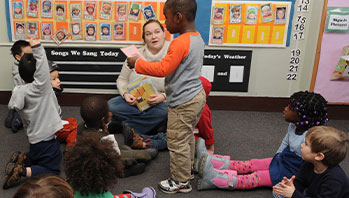MA Standards:
English Language Arts/Speaking and Listening/SL.PK.MA.1a: Observe and use appropriate ways of interacting in a group (e.g., taking turns in talking, listening to peers, waiting to speak until another person is finished talking, asking questions and waiting for an answer, gaining the floor in appropriate ways).
English Language Arts/Foundational Skills/RF.PK.MA.2: With guidance and support, demonstrate understanding of spoken words, syllables, and sounds (phonemes).
Head Start Outcomes:
Literacy Knowledge/Phonological Awareness: Identifies and discriminates between separate syllables in words.
PreK Learning Guidelines:
English Language Arts/Language 1: Observe and use appropriate ways of interacting in a group (taking turns in talking; listening to peers; waiting until someone is finished; asking questions and waiting for an answer; gaining the floor in appropriate ways).
English Language Arts/Reading and Literature 8: Listen to, identify, and manipulate language sounds to develop auditory discrimination and phonemic awareness.
Word Play: Hopping Syllables #2

© Commonwealth of Massachusetts, Department of Early Education and Care (Jennifer Waddell photographer). All rights reserved.
ELA Focus Skills: Phonological Awareness (Segmenting), Vocabulary
Have children stand in a circle. Say, Inside the circle is our garden. Earthworms live in our garden. Ask a few children to step inside the garden. Say.
- Each of you is an earthworm. Let’s say the word together: earthworm. I’m going to say the word again and clap the word parts: earth-worm.
- I’m going to say the word again. This time, I want the earthworms to hop the word parts. Ready? Earth-worm.
- Ask the children who are part of the circle, How many times did the earthworms hop? Two times. There are two syllables, or word parts, in the word earthworm.
- Repeat the process using the words vegetable (veg-e-ta-ble), cucumber (cu-cum-ber), cauliflower (cau-li-flow-er), and watermelon (wa-ter-mel-on).
- Make sure each child has a chance to hop.
Adaption: With very young children, practice how to hop and then have the whole group hop each word together.
